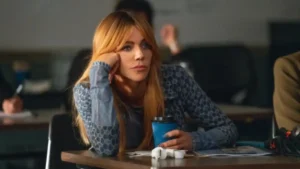Summary
An interesting idea executed poorly, The Cloverfield Paradox has too much going on, too many ideas and not enough focus.
This is the latest entry in the Cloverfield franchise, which is the brainchild of creator and producer J. J. Abrams. The first film, Cloverfield, directed by Matt Reeves, was a found footage movie documenting a mysterious giant monster laying waste to New York. The second movie, 10 Cloverfield Lane, directed by Dan Trachtenberg, shifts to something closer to a psychological thriller, as three people sit out a catastrophic crisis event in a bunker. The two films certainly share some of the same DNA even if one is not a direct sequel to the other. There are familiar themes and elements across Cloverfield and 10 Cloverfield Lane.
The Cloverfield Paradox is the third instalment of the anthology franchise, this time directed by Julius Onah, continuing the trend of giving a chance to up and coming directors. The film got a surprise release straight onto Netflix late last night. Is this a marketing masterstroke or is it just not that good?
What’s the setup this time, then?
There’s an energy crisis on Earth (yes, another one) that’s threatening to devolve into all-out global war. Thankfully there’s a plan in place in the form of the Cloverfield space station that contains The Shepherd, an experimental particle accelerator McGuffin that could potentially generate infinite clean energy and save the world. We join communications officer, Hamilton (Gugu Mbatha-Raw), as she decides to leave her husband, Michael (Roger Davies), behind to go and boldly save the world, along with the rest of the crew of the Cloverfield space station. The crew have been in action up in space for nearly two years and are fast running out of time. With only enough energy for three more goes at getting the particle accelerator going, are they going to be able to make it in time and save us all?
Why are they doing these vital experiments in space?
It’s never really explicitly explained, actually. I had assumed that what they were doing was so risky that it should be done away from the planet. Either that, or the particle accelerator needed to run in zero gravity or something. I can only assume that in the Cloverfield universe they don’t really have much in the way of a movie industry, though. If films have taught me anything it’s that sending humanity’s last hope out into space to try and solve the problem never really goes smoothly.
Good point. So do things go to plan?
Thankfully they don’t, otherwise, we’d have quite a drab story on our hands. Once the Shepherd is activated things start to go awry aboard the space station. Despite being concerned about the threat of damaging space-time, or opening the door to another reality, the crew of the Cloverfield space station still seem shocked when things don’t really go smoothly.
I’d expect nothing less. How does it stack up against the other Cloverfield films?
I really like the other films in the Cloverfield universe. I remember being blown away when I first saw the original Cloverfield. It was a really interesting new take on the found footage genre, which was starting to get a little stale, and it felt like it reinvigorated the giant monster movie. I should say that I first watched that film on my laptop, while on a plane. I think seasick probably undersells how bad I felt after watching it. But I still loved it, which I think is high praise indeed.
The second film, 10 Cloverfield Lane, was one of my favourites of 2016. It shifted gears to be something entirely different, and was a really effective psychological thriller in its own right, with John Goodman giving an incredibly menacing performance. The ending of 10 Cloverfield Lane was a little too much for some people, but I thought it really worked. I think from that it’s safe to say I was a big fan of the franchise to date, and was really looking forward to The Cloverfield Paradox. I couldn’t believe that it had just silently appeared on Netflix overnight without a huge build up. I couldn’t wait to get started with it this morning.
Yes, go on… does it live up to your expectations?
Bad news. It really didn’t. In some respects, the film reminded me of Danny Boyle’s Sunshine. There’s the really obvious comparison of mankind’s last hope sent out on a spaceship to try and save the world, but aside from that they’re structured quite similarly. I always thought that the first half of Sunshine was superb and set up a really interesting premise, but then the second half fails to deliver on the early promise and goes off on a strange tangent. I think the same is really true of The Cloverfield Paradox. The central idea in the opening half of the film seems like it could be really interesting, but then the direction they decided to take in the second half really doesn’t make the most of the early promise.
Well, that doesn’t sound too bad. I quite like Sunshine and if it’s anything like that it can’t be all bad?
I think it’s only fair to point out that this is pretty much where the comparison with Sunshine ended for me. While the setup and premise of the film seems like it could be really interesting, the execution just isn’t great. The characters just really didn’t do it for me and felt like a collection of stereotypes rather than some of the Earth’s best and brightest. In some respects it felt quite a lot like Prometheus, in that this was supposedly a crew of really smart people, and yet they just seem to do stupid things. Not to mention the fact that whoever put this crew together didn’t actually consider whether they could work as a team. It seems that nearly all of the people aboard the Cloverfield space station don’t really trust each other and some of them downright hate each other.
Right, this sounds a bit worse now.
Oh, theres more. I’m aware that I’m drawing a lot of comparisons in this review, but that’s mainly because it kept relying on fairly well-worn tropes. The previous two films felt like they were really well put together movies and while they were relatively small-scale, low-budget affairs, they never felt cheap. The Cloverfield Paradox feels like a made-for-TV movie. In fact, the thing that it most brought to mind was that it really felt like an episode of Black Mirror rather than a flagship feature film.
I like Black Mirror.
You know how in a typical series of Black Mirror about 50% of the episodes are good, 25% are okay, and the remaining 25% are real stinkers? This felt like one of the those.
Ah.
I don’t know what I was expecting, but it just felt so cheap. The CGI and set design looked like something that had been done on a TV budget. Actually, that’s unfair. The production values here really make Battlestar Galactica look expensive and lavish. The whole aesthetic of the ship just really didn’t work for me.
The acting isn’t much better either. It felt like everyone was going through the motions, with little to no chemistry between any of the major players. I really didn’t find myself too invested in the characters. None of them were particularly likeable
The plot was all over the place, with things happening for no real reason and at times the explanations for what was going on seemed to come from nowhere. I had to rewind a couple of times to see if I’d just missed something, but I hadn’t. There was just a lack of logic to everything. There’s a whole subplot playing out with Michael back on Earth that seems kind of unnecessary and confusing.
The other Cloverfield movies have at least packed a few surprises. Does The Cloverfield Paradox manage the same?
Not really. There are some nice links back to the broader franchise, but even they’re done in such a way that they just end up being confusing and feeling tacked on. There aren’t really many twists and turns that feel like they’re earned, with things just seeming to happen because of reasons.
Recommendation?
Not really. I was really hoping for something special here, or at least a new spin on a familiar genre, because that’s what the Cloverfield franchise has delivered in the past. It feels like there is an interesting idea in here but that it has just been executed really poorly. I like the central premise of the film, but I thought there was just too much going on here, with too many ideas and not enough focus. When this appeared so quickly on Netflix it seemed like this meant it was either a genius move, or they realised it wasn’t great, so stuck it on Netflix rather than going for a theatrical release. I really think that it was the latter.




